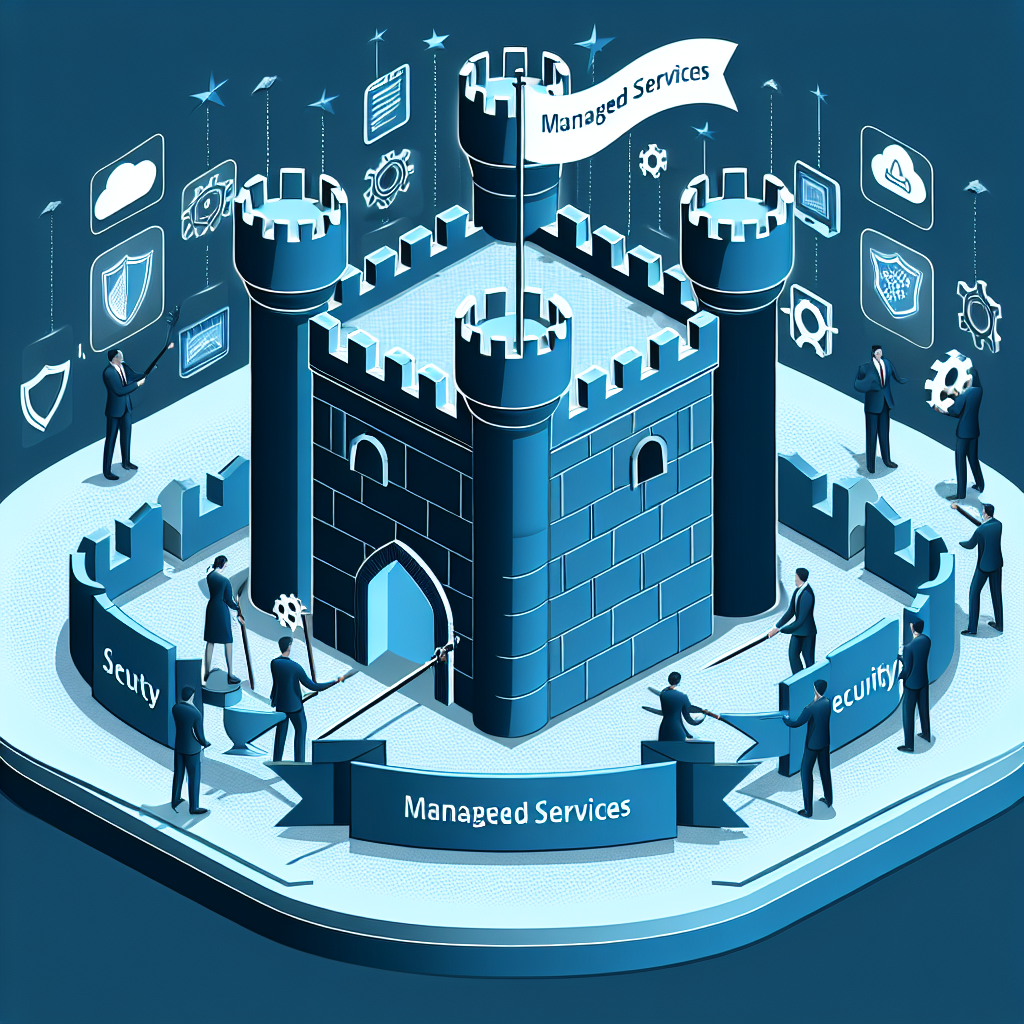Your cart is currently empty!
Tag: Managed Services

The Benefits of Outsourcing IT with Managed Services
In today’s fast-paced business environment, technology plays a crucial role in ensuring the success and growth of a company. From managing data and communication systems to ensuring network security, the IT department is at the heart of every organization. However, managing an in-house IT team can be a complex and costly endeavor for many businesses.This is where outsourcing IT with managed services comes in. Managed services providers (MSPs) offer a range of IT services and support to businesses, allowing them to focus on their core operations while leaving the technical aspects to the experts. Here are some of the benefits of outsourcing IT with managed services:
Cost Savings: One of the main advantages of outsourcing IT with managed services is cost savings. By outsourcing IT functions to a third-party provider, businesses can reduce the costs associated with hiring and training in-house IT staff, as well as investing in expensive hardware and software. MSPs offer flexible pricing models that allow businesses to pay only for the services they need, helping them save money in the long run.
Access to Expertise: Managed services providers have a team of experienced and certified IT professionals who are well-versed in the latest technologies and best practices. By outsourcing IT, businesses can access this expertise without having to invest time and resources in training their own staff. MSPs also stay up-to-date on industry trends and security threats, ensuring that businesses have the most reliable and secure IT infrastructure.
Improved Efficiency: Outsourcing IT with managed services allows businesses to focus on their core operations and strategic goals, rather than getting bogged down in technical issues. MSPs offer proactive monitoring and maintenance of IT systems, ensuring that problems are identified and resolved before they escalate. This helps businesses minimize downtime and improve overall efficiency.
Scalability: Managed services providers offer scalable solutions that can be tailored to meet the specific needs of a business. Whether a company is experiencing rapid growth or needs to downsize, MSPs can adjust their services accordingly. This flexibility allows businesses to adapt to changing market conditions without having to worry about their IT infrastructure.
Enhanced Security: Cybersecurity threats are on the rise, and businesses need to take proactive measures to protect their data and systems. Managed services providers offer robust security solutions, such as firewalls, antivirus software, and intrusion detection systems, to safeguard against cyber threats. MSPs also provide regular security updates and patches to ensure that businesses are protected against the latest threats.
Overall, outsourcing IT with managed services can provide businesses with a cost-effective, efficient, and secure IT infrastructure that supports their growth and success. By partnering with a reputable MSP, businesses can focus on what they do best while leaving the technical aspects to the experts.

The Future of Managed Services: Innovations and Opportunities
Managed services have become an integral part of the technology industry, offering businesses a cost-effective and efficient way to outsource their IT needs. As technology continues to evolve at a rapid pace, the future of managed services is filled with innovations and opportunities that promise to revolutionize the way businesses operate.One of the most significant trends in managed services is the rise of artificial intelligence and machine learning. These technologies are being used to automate routine tasks, monitor systems for potential issues, and provide predictive analytics that can help businesses make informed decisions. This not only saves time and resources but also improves the overall performance and security of IT systems.
Another key development in managed services is the shift towards cloud-based solutions. Cloud computing offers businesses greater flexibility, scalability, and cost savings compared to traditional on-premise IT infrastructure. Managed service providers are increasingly offering cloud-based services such as data storage, backup, and disaster recovery, allowing businesses to access their data and applications from anywhere in the world.
The Internet of Things (IoT) is also shaping the future of managed services. With more devices becoming connected to the internet, businesses are looking for ways to manage and secure their IoT devices. Managed service providers are stepping in to offer solutions that can monitor and control IoT devices, as well as provide insights into how they are being used.
Cybersecurity is another area where managed services are playing a crucial role. With the increasing number of cyber threats and data breaches, businesses are turning to managed service providers to help them protect their sensitive information. Managed security services can include everything from firewall management and intrusion detection to threat intelligence and incident response, giving businesses peace of mind that their data is secure.
Overall, the future of managed services is bright, with countless opportunities for innovation and growth. Businesses that embrace these technologies and services will be able to stay ahead of the competition and drive their success in the digital age. By leveraging the expertise and resources of managed service providers, businesses can focus on their core operations while leaving their IT needs in capable hands.

Managed Services vs. In-House IT: Making the Best Choice for Your Business
In today’s rapidly changing business landscape, technology plays a crucial role in driving growth and productivity. As a result, businesses of all sizes are increasingly relying on IT systems and infrastructure to stay competitive. However, the question of whether to opt for managed services or in-house IT support continues to be a crucial decision for many organizations.Managed services refer to the practice of outsourcing the management of IT systems and functions to a third-party provider. These providers offer a range of services, including network monitoring, data backup, cybersecurity, and helpdesk support, among others. In contrast, in-house IT involves hiring and managing a dedicated team of IT professionals to handle all technology-related tasks and issues internally.
So, how do you decide which option is best for your business? Let’s explore the benefits and drawbacks of both managed services and in-house IT support to help you make an informed decision.
Managed services offer several advantages, including cost savings, access to a team of experts, and scalability. By outsourcing IT functions to a managed services provider, businesses can reduce overhead costs associated with hiring and training IT staff. Additionally, managed services providers typically have a team of experts with specialized skills and experience, ensuring that your IT systems are well-maintained and secure. Moreover, managed services are scalable, allowing businesses to easily adjust their IT support needs as their operations grow or change.
On the other hand, in-house IT support provides businesses with greater control and customization over their IT systems. With an in-house team, businesses can tailor their IT infrastructure to meet specific requirements and business goals. In-house IT staff also have a deeper understanding of the business’s operations and can provide more personalized support. However, in-house IT support can be costly and time-consuming, as businesses must invest in hiring, training, and retaining skilled IT professionals.
Ultimately, the decision between managed services and in-house IT support will depend on the unique needs and objectives of your business. Consider factors such as your budget, technological requirements, and long-term goals when evaluating your options. Some businesses may find that a combination of both managed services and in-house IT support is the best solution, allowing them to leverage the benefits of both approaches.
In conclusion, choosing between managed services and in-house IT support is a critical decision that can have a significant impact on your business’s success. Carefully weigh the pros and cons of each option to determine which one aligns best with your business needs. Whether you opt for managed services, in-house IT support, or a combination of both, investing in reliable and efficient IT support is essential for driving growth and staying ahead in today’s competitive market.

Top Trends in Managed Services for Business Growth
In today’s fast-paced and ever-changing business environment, the need for managed services has become more crucial than ever before. Managed services offer businesses the opportunity to outsource their IT infrastructure and support needs to a third-party provider, allowing them to focus on their core business functions and drive growth.As businesses continue to evolve, so do the trends in managed services. Here are some of the top trends in managed services that are driving business growth in 2021:
1. Cloud Services: The adoption of cloud services has been steadily increasing in recent years, and this trend is set to continue in 2021. Cloud services offer businesses the flexibility and scalability they need to adapt to changing market conditions and customer demands. Managed service providers are now offering a wide range of cloud services, including cloud storage, backup and disaster recovery, and cloud-based applications.
2. Security Services: With the rise of cyber threats and data breaches, businesses are increasingly turning to managed service providers for security services. Managed security services offer businesses the expertise and technology they need to protect their networks, data, and applications from cyber attacks. This trend is expected to grow in 2021 as businesses look for ways to secure their digital assets against evolving threats.
3. AI and Automation: Artificial intelligence (AI) and automation are transforming the way businesses operate, and managed service providers are now incorporating these technologies into their services. AI and automation can help businesses streamline their operations, improve efficiency, and reduce costs. Managed service providers are now offering AI-powered solutions for tasks such as network monitoring, data analysis, and predictive maintenance.
4. Remote Work Solutions: The COVID-19 pandemic has accelerated the shift towards remote work, and managed service providers are now offering a range of solutions to support remote work environments. These solutions include virtual desktop infrastructure (VDI), collaboration tools, and secure remote access services. With remote work expected to continue in 2021 and beyond, businesses are turning to managed service providers for the technology and support they need to enable a productive and secure remote workforce.
5. Managed IoT Services: The Internet of Things (IoT) is transforming industries across the globe, and managed service providers are now offering IoT services to help businesses harness the power of connected devices. Managed IoT services can help businesses collect and analyze data from IoT devices, optimize their operations, and drive innovation. This trend is expected to grow in 2021 as businesses look for ways to leverage IoT technologies to gain a competitive edge.
In conclusion, the top trends in managed services for business growth in 2021 are focused on cloud services, security services, AI and automation, remote work solutions, and managed IoT services. By embracing these trends and partnering with a reputable managed service provider, businesses can position themselves for success in today’s digital economy.

Understanding the Role of Managed Services in Digital Transformation
Digital transformation is the process of integrating digital technologies into all aspects of a business, fundamentally changing how it operates and delivers value to its customers. In today’s fast-paced and technology-driven world, digital transformation has become essential for businesses to stay competitive and relevant.One of the key components of a successful digital transformation strategy is the utilization of managed services. Managed services refer to the practice of outsourcing certain IT functions to a third-party service provider, who takes on the responsibility of managing and maintaining these functions on behalf of the business.
Managed services play a crucial role in digital transformation by enabling businesses to focus on their core competencies and strategic initiatives, while leaving the day-to-day IT operations to experts. By partnering with a managed services provider, businesses can access a wide range of IT services and solutions, including network management, cybersecurity, cloud computing, data analytics, and more.
Managed services help businesses to streamline their IT operations, improve efficiency, and reduce costs. With the help of a managed services provider, businesses can leverage the latest technologies and tools to enhance their digital capabilities and drive innovation. This allows businesses to adapt to changing market conditions, meet customer demands, and stay ahead of the competition.
Furthermore, managed services providers offer scalability and flexibility, allowing businesses to easily scale their IT resources up or down as needed. This is particularly important for businesses undergoing digital transformation, as they need to be able to quickly adapt to changing technology requirements and market dynamics.
In conclusion, managed services play a crucial role in digital transformation by providing businesses with the expertise, resources, and support they need to succeed in today’s digital economy. By partnering with a managed services provider, businesses can accelerate their digital transformation journey and achieve their strategic goals more effectively. If you are considering embarking on a digital transformation journey for your business, be sure to explore the benefits of managed services and how they can help you achieve success in the digital age.

The Evolution of Managed Services: What to Expect in 2020
Managed services have come a long way since their inception, evolving to meet the ever-changing needs of businesses in the digital age. As we head into 2020, it’s important to take a look at how managed services have evolved and what we can expect in the coming year.One of the biggest trends in managed services is the shift towards a more proactive approach. In the past, managed service providers (MSPs) were primarily focused on fixing problems as they arose. However, as technology has become increasingly complex and integral to business operations, MSPs are now taking a more preventative approach to IT management. This means actively monitoring and maintaining systems to prevent issues before they occur, rather than simply reacting to problems after the fact.
Another key trend in managed services is the move towards cloud-based solutions. Cloud computing has revolutionized the way businesses operate, offering increased flexibility, scalability, and cost savings. As a result, many MSPs are now offering cloud-based services to help their clients take advantage of these benefits. This shift towards the cloud is expected to continue in 2020, with more businesses embracing cloud technology as a core part of their IT strategy.
Security is also a top priority for businesses in 2020, and managed service providers are stepping up to meet this demand. With cyber threats becoming increasingly sophisticated, businesses are looking to MSPs to help them stay ahead of the curve. Managed security services, such as firewall management, intrusion detection, and threat intelligence, are becoming essential components of any IT management strategy. In 2020, we can expect to see continued growth in the managed security services market as businesses seek to protect their data and infrastructure from cyber attacks.
As businesses become more reliant on technology, the role of managed service providers will continue to expand. In addition to traditional IT services, MSPs are now offering a wide range of specialized services to help businesses stay competitive in today’s fast-paced digital world. From data analytics to IoT management, MSPs are evolving to meet the diverse needs of their clients.
Overall, the evolution of managed services in 2020 will be characterized by a focus on proactive IT management, cloud-based solutions, and enhanced security measures. Businesses will continue to rely on MSPs to help them navigate the complexities of the digital landscape and drive innovation in their organizations. By partnering with a trusted managed service provider, businesses can stay ahead of the curve and achieve their goals in the coming year and beyond.

Enhancing Cybersecurity with Managed Services: A Practical Approach
In today’s digital age, cybersecurity has become a top priority for businesses of all sizes. With the increasing number of cyber threats and attacks, it is essential for organizations to have robust security measures in place to protect their sensitive data and information. One effective way to enhance cybersecurity is by utilizing managed services.Managed services offer a practical approach to cybersecurity by outsourcing the management and monitoring of security systems to a third-party provider. This allows businesses to focus on their core operations while experts handle the complex task of securing their IT infrastructure.
One of the key benefits of managed services is the round-the-clock monitoring and threat detection. Managed service providers have advanced tools and technologies that can detect and respond to security threats in real-time, minimizing the risk of a data breach or cyber attack. This proactive approach to cybersecurity can help businesses stay ahead of potential threats and prevent costly security incidents.
Another advantage of managed services is the access to a team of skilled security professionals. These experts have the knowledge and experience to implement best practices and security protocols to protect against evolving cyber threats. By leveraging their expertise, businesses can strengthen their security posture and reduce the likelihood of a breach.
Managed services also offer regular security updates and patches to ensure that systems are up-to-date and protected against the latest vulnerabilities. This proactive maintenance can help prevent security gaps and ensure that businesses are always one step ahead of cybercriminals.
Additionally, managed services can provide businesses with valuable insights and analytics on their security posture. By monitoring and analyzing security data, businesses can identify potential weaknesses in their systems and take proactive measures to address them. This data-driven approach can help businesses make informed decisions about their cybersecurity strategy and improve their overall security posture.
In conclusion, enhancing cybersecurity with managed services offers a practical and effective approach to protecting against cyber threats. By outsourcing security management to experts, businesses can benefit from round-the-clock monitoring, access to skilled professionals, regular updates, and valuable insights. This proactive approach to cybersecurity can help businesses mitigate risks, protect sensitive data, and safeguard their reputation in an increasingly digital world.

Managed Services vs. In-House IT: Making the Case for Outsourcing
In today’s fast-paced business environment, technology plays a crucial role in the success of any organization. As businesses grow and evolve, the need for efficient IT solutions becomes more apparent. However, many companies struggle with the decision of whether to manage their IT needs in-house or outsource them to a managed services provider.Managed services vs. in-house IT is a debate that has been ongoing for years. While there are benefits to both approaches, outsourcing IT services to a managed services provider can often be the better choice for businesses looking to streamline their operations and improve their overall efficiency.
One of the key advantages of outsourcing IT services to a managed services provider is cost savings. When businesses manage their IT needs in-house, they often have to invest in expensive hardware, software, and personnel to handle their IT infrastructure. On the other hand, outsourcing IT services allows businesses to pay a fixed monthly fee for a range of services, eliminating the need for costly upfront investments and reducing overall IT expenses.
Another benefit of outsourcing IT services is access to a team of experts. Managed services providers employ skilled professionals who specialize in various areas of IT, including network security, cloud computing, and data backup. By outsourcing IT services, businesses can tap into the expertise of these professionals and benefit from their knowledge and experience, without having to hire and train an in-house IT team.
Additionally, outsourcing IT services can help businesses improve their overall efficiency and productivity. Managed services providers offer round-the-clock monitoring and support, ensuring that IT issues are promptly addressed and resolved before they have a chance to disrupt business operations. This proactive approach to IT management can help businesses minimize downtime, increase employee productivity, and ultimately improve customer satisfaction.
In conclusion, while there are benefits to managing IT needs in-house, outsourcing IT services to a managed services provider can often be the more cost-effective and efficient choice for businesses. By partnering with a managed services provider, businesses can access a team of experts, reduce IT expenses, and improve overall efficiency, ultimately helping them achieve their business goals and stay ahead of the competition.

Maximizing ROI with Managed Services: A Comprehensive Overview
In today’s competitive business landscape, maximizing return on investment (ROI) is essential for staying ahead of the curve. One way companies are achieving this is through the use of managed services. Managed services offer businesses the opportunity to outsource their IT needs to a third-party provider, allowing them to focus on their core business activities while benefiting from the expertise and resources of a dedicated team.There are several key ways in which managed services can help companies maximize their ROI. Firstly, by outsourcing their IT needs, companies can reduce costs associated with hiring and training in-house IT staff. Managed services providers typically offer flexible pricing models, allowing businesses to pay only for the services they need, when they need them. This can result in significant cost savings over time.
Furthermore, managed services providers often have access to the latest technology and tools, which can help companies improve their operational efficiency and productivity. By leveraging the expertise of a managed services team, companies can ensure that their IT infrastructure is up-to-date and secure, reducing the risk of costly downtime and data breaches.
Another key benefit of managed services is the ability to scale resources as needed. As businesses grow and evolve, their IT needs may change. Managed services providers can quickly and easily adjust their services to meet the changing needs of their clients, ensuring that they have the resources they need to support their growth and success.
In addition, by outsourcing their IT needs to a managed services provider, companies can free up valuable time and resources that can be reinvested in other areas of their business. This can lead to increased innovation, improved customer service, and ultimately, greater profitability.
Overall, maximizing ROI with managed services is a smart business decision for companies of all sizes. By outsourcing their IT needs to a third-party provider, businesses can reduce costs, improve efficiency, and focus on their core business activities. This can result in a significant return on investment over time, making managed services a valuable asset for companies looking to stay competitive in today’s fast-paced business environment.

